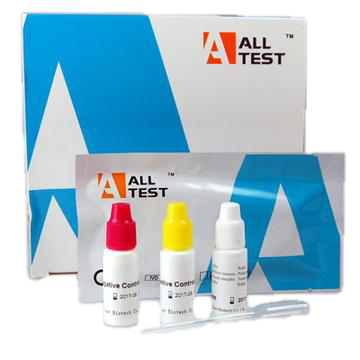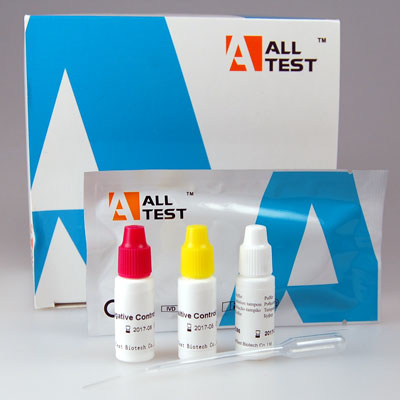Collection: Infectious Mononucleosis Tests
-
ALLTEST Professional Infectious Mononucleosis Test Kits Pack Of 20
No reviewsRegular price £39.99 GBPRegular priceUnit price / per
Professional rapid onsite Infectious Mononucleosis test kits
May be used to diagnose infectious mononucleosis also known as glandular fever infections. Infectious Mononucleosis (IM) is the result of an infection caused by the Epstein-Barr virus (EBV). Gladular fever (IM) presents with symptoms such as fever, a sore throat, swollen lymph glands and tiredness.
Key features of the ALLTEST Infectious Mononucleosis Tests
- Rapid Monospot Glandular Fever blood screening test kits
- Suitable for venous whole blood and capillary/finger prick samples as well as serum and plasma samples
- Fast results in under 10 minutes
- Simple easy to read results either positive or negative
- This is a professional medical diagnostic test kit intended solely for use by healthcare professionals and doctors.
- Bulk pack of Glandular fever tests with 20 tests in each pack
- Fully CE approved for professional medical use
The equipment for obtaining a blood sample for the Infectious Mononucleosis test kits is not provided with the packs of test kits. Bulk packs of lancets and auto-lancing devices for obtaining a finger-prick blood sample are available to purchase online here.
Infectious Mononucleosis
Infectious Mononucleosis (IM for short), also known as mono or glandular fever, is a viral infection primarily caused by the Epstein-Barr virus (EBV). EBV is a member of the herpes virus family and is highly prevalent worldwide, particularly among adolescents and young adults.
IM is typically transmitted through close contact with infected individuals, primarily through saliva. This can occur through activities such as kissing, sharing utensils or drinks, or even coughing and sneezing. The virus can also spread through blood transfusions or organ transplants, although these cases are relatively rare.
The incubation period for IM, which is the time between exposure to the virus and the onset of symptoms, ranges from 4 to 6 weeks. During this period, the infected person may not show any signs of illness but can still transmit the virus to others.
Common symptoms of Glandular Fever (IM) include:
-
Fatigue: Extreme tiredness and lack of energy are hallmark symptoms of Glandular Fever. The fatigue can be extreme and persist for weeks or even months.
-
Fever: Many individuals with IM experience a mild to moderate fever, usually ranging from 100.4°F to 104°F (38°C to 40°C).
-
Sore throat: A severe and persistent sore throat is a typical symptom of Mono. The throat may be red, swollen, and accompanied by difficulty swallowing.
-
Swollen lymph nodes: The lymph nodes, particularly those in the neck and armpits, may become enlarged and tender. This is often one of the first noticeable symptoms.
-
Headache and body aches: Some people with Glandular Fever may experience headaches, muscle aches, and joint pain.
-
Rash: A small percentage of individuals may develop a rash, which is usually non-itchy and disappears on its own.
In addition to these primary symptoms, IM can also cause other less common symptoms some of which can be serious such as enlarged spleen, liver inflammation, swollen tonsils, loss of appetite, and night sweats. Diagnosis of IM typically involves a combination of physical examination, medical history assessment, and laboratory tests. Blood tests can reveal an elevated number of white blood cells, the presence of atypical lymphocytes, and positive antibody tests for EBV.
Treatment for IM is primarily supportive and aims to relieve symptoms. This includes getting plenty of rest, staying hydrated, and taking over-the-counter pain relievers to manage fever, sore throat, and body aches. It is important to avoid strenuous physical activity to prevent complications like splenic rupture. Most cases of IM resolve within a few weeks to a couple of months, with symptoms gradually improving over time. However, it's worth noting that the Epstein-Barr virus remains in the body even after the infection has cleared, and it can reactivate later in life without causing IM symptoms.
It is advisable to consult a healthcare professional for proper diagnosis and guidance on managing infectious mononucleosis, as the severity of the illness can vary between individuals.


